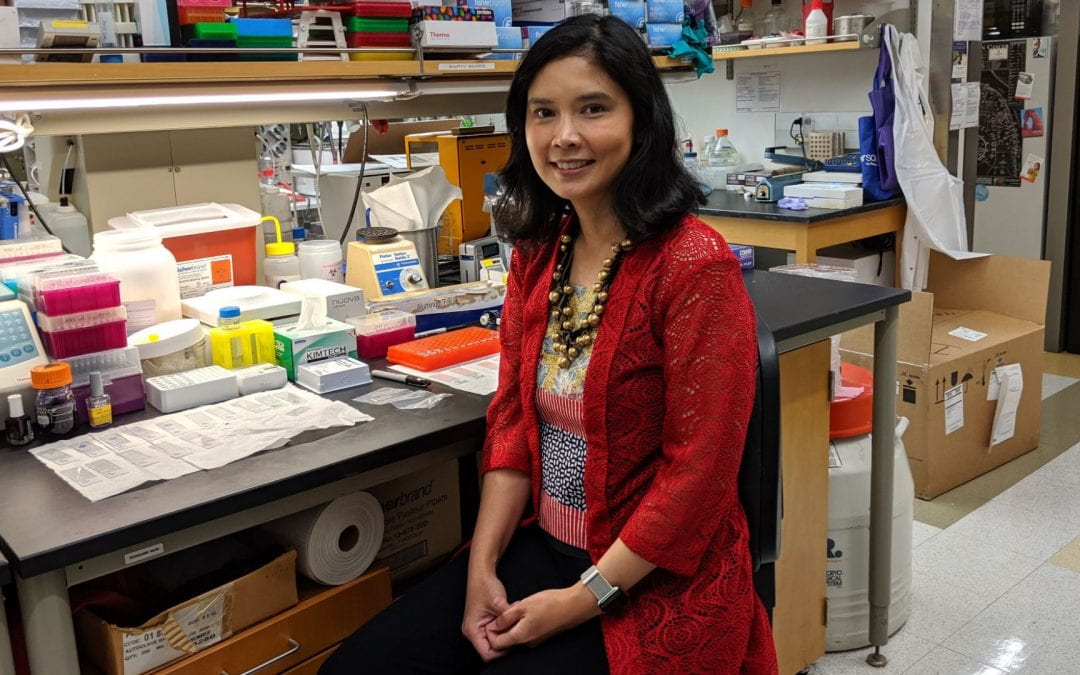“My plan was to become a pharmacist,” says Irawati (Angki) Kandela, PhD, Assistant Director of the Developmental Therapeutics Core (DTC), a CLP-affiliated core facility, and Research Assistant Professor in the Pharmacology Department at Northwestern. Growing up in Indonesia where most of her family members were doctors, Kandela thought she would branch out into pharmacy. Her goal was to someday rent space inside a family-owned clinic and handle patient prescriptions. During her fourth year in pharmacy school, however, a new calling emerged.
“One night, I worked from seven until midnight adding non-active ingredients to increase the solubility of indomethacin and I really got into it,” says Kandela. “I realized then that research is fun and I should continue with it.”
Upon her father’s advice, she travelled to San Francisco in 1999 to learn English and apply for graduate school. Six months later, she was accepted into the pharmaceutical sciences program at the University of Wisconsin-Madison. Finding a way to pay for school was her next challenge. Leveraging her pharmaceutical background, Kandela succeeded in securing a teaching assistant position that enabled her to graduate debt-free.
With her newly minted PhD, she accepted a position with radiopharmaceutical company Novelos, Inc. (formerly Cellectar) based in Madison, Wisconsin. Her research focused on targeted drug delivery using alkyl-phospholipid bound to radio-iodine 131 (I-131) for cancer treatment. After filing several patents, she was promoted to manager of the Biology Department.
“The job taught me a lot about GLP [good laboratory practice], IND [investigational new drug] applications to the FDA [US Food and Drug Administration], quality assurance, clinical teams, and making drugs for human beings,” says Kandela.
In 2011, she joined Northwestern University as a research associate with the primary responsibility of launching the Developmental Therapeutics Core facility within the Center for Developmental Therapeutics. Since then, more than 45 faculty members from across the University have tapped the core for its expertise in preclinical evaluation of new therapeutics, laboratory facilities and access to small animal models. Kandela was promoted to research assistant professor in the Center for Developmental Therapeutics with a secondary appointment in the department of Pharmacology in 2017.
“We work with our hands, our energy and our minds,” says Kandela. “On a typical day, I take care of all the studies in the morning to make sure the animals are checked, treated, or dosed. Afternoons are for clients and other business.”
From using models of patient-derived xenografts (PDX models) for a new cancer drug test, to evaluating the effectiveness of tiny, implanted neuro sensors, Kandela works with biologists, chemists and engineers on a variety of interesting projects. What keeps clients coming back is her work ethic, high standards, problem-solving, and positive attitude. When initial study results disappoint, Kandela will suggest a modification, such as changing the frequency or concentration of the dose, combining the drug with another second drug, or repurposing another drug. These small tweaks often help projects get back on track.
“At the end of the day, we have to let the science guide us. You can’t rush things and you must stay open-minded.”
Her motivation runs deep.
“When my grandma died of brain cancer, I made a promise to be involved in drug development so that, hopefully, one day, a new drug would be on the market and I would play a tiny part in moving that process forward. To be able to make an impact like that would be wonderful.”
And what would she have told her ten-year-old self based on what she knows now?
“Just enjoy the ride,” says Kandela.
by Lisa La Vallee
